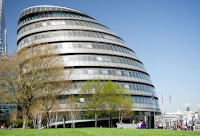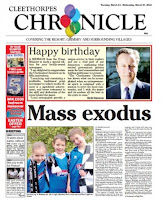Peter Preston in the Observer on Jon Snow's claim journalists are comfortable with the elite, with little awareness, contact, or connection with those not of the elite: "When Jon (educated Winchester Pilgrim’s School via Ardingly) looks around his own C4 News studio, who does he see? Matt Frei, educated at Westminster School and St Peter’s College, Oxford. Krishnan Guru-Murthy, educated at Queen Elizabeth’s Grammar School, Blackburn, and Hertford College, Oxford. Cathy Newman, educated at Charterhouse and Lady Margaret Hall, Oxford. With Fatima Manji, lately of the LSE, waiting in line. Is this some covert cause for shame? No: the camera sees a team of formidable professionals, experienced people – largely free from commercial pressures – who can uncover stories and pursue unpopular causes. They are not representatives of one class or another. They are trained journalists: and that training means an ability to dig and discover wherever the news takes them."
Former Daily Mirror editor David Banks in a letter to the Guardian: "Peopling journalism with home counties-bred, middle-class varsity types whose family incomes and proximity to London enable their offspring to fulfil the required “zero pay” contract for a couple of years is a poor way to build a campaigning, popular press; so is recognising an army of gossipy, untrained bloggers as a reasonable alternative to news. An excellent alternative is offered by former leading regional and international editor Neil Fowler, who proposes a national network of (hopefully profitable) local newspapers run by universities and major journalism colleges offering student journalists a two-year course/contract. Learning local journalism on the job would take the accidents of both birth and geography out of the business of producing fine, trustworthy journalists, as was the training regime when I was a junior on a Warrington weekly."
Readers' editor Stephen Pritchard in the Observer: "As an 18-year-old junior reporter, fresh out of an independent school and away from a comfortable middle-class home for the first time, I found myself pitched into a world of which I knew little. Learning my trade on a big city evening newspaper was a passport into alien lives, from the pomp and power of those in authority to those that today we would call the left behind, those who looked to 'their paper' to articulate their worries, their needs. It educated me. It changed me...Caught in a vicious spiral of declining advertising and falling circulations, newspapers today cannot afford large staffs to do the sort of foot-slogging that so many of us did in our youth. Stories go untold. Would Grenfell Tower have happened if a vigorous local media were reporting tenants’ concerns and putting pressure on the council? I doubt it."
Roy Greenslade on his IPSO blog: "Thinking back to my days as a weekly newspaper reporter in the poorest London borough, Barking and Dagenham, neither my paper – nor the rival titles across the whole of east London – got to the heart of the area’s social deprivation. Our journalism was reactive rather than pro-active. It was as if we accepted the situation rather than challenging it. For example, to paraphrase Tony Blair, we were good at reporting crime but hopeless at reporting the causes of crime."
Robert Shrimsley in the Financial Times: "The Sun sped the end of deference among ordinary people; deference to the establishment, to the elites, to the royal families and — as we saw in the Brexit campaign — experts. The Sun’s direct political power is often exaggerated, but is it too much to say that Brexit would not have happened but for political discourse The Sun helped mould?"
Andrew Norfolk in The Times [£]: "When The Times told Tower Hamlets last week of its intention to reveal the council’s decision to place a white British child with a family whose culture, faith and primary language were alien, the local authority tried to block the story. It contacted the East London family court, where the girl’s case was the subject of care proceedings, and told Judge Sapnara that confidential court documents had been unlawfully leaked and publication of an article would be an offence. Security staff at the court, where a case hearing took place yesterday morning, ordered a Times journalist to leave the building and threatened an escorted removal by security guards unless the reporter left voluntarily. When Judge Sapnara was informed of the newspaper’s wish to attend the hearing, the reporter was readmitted."
The Times reported on Thursday (Aug 31): "Courts were ordered never to ban the media from their buildings yesterday after journalists covering the case of a Christian girl fostered by a Muslim family were refused entry. Security staff were told to bar reporters from the East London family court the day after the judge in the case praised The Times for acting responsibly in raising “very concerning matters” of “legitimate public interest”.Journalists were given increased access to family court hearings by the government in 2009 after an award-winning campaign by The Times for open justice."
- The Guardian reports The Times has attracted 10 complaints to the Independent Press Standards Organisation over the reporting of the child fostering case and the Mail has generated six.
i editor Oliver Duff announcing a 10p cover price: "Paid-for journalism in this country faces an unprecedented challenge from the avalanche of free, and often not very good, articles online. The types of journalism that hold the powerful to account and shine a spotlight on society are of little interest to many digital media, especially platforms like Facebook which gobble advertising revenue without any regard for the social contract that once existed between reader and publisher. We are here to inform as well as entertain, and we don’t forget it. A price increase would allow us to cover the rising costs of making i, safeguard against fluctuations in advertising revenue (one national media title recently reported a £62m loss), and invest again in the paper – giving i a bright future."
Nicholas Kristof in the New York Times: "Sigh. If only President Trump denounced neo-Nazis as passionately and sincerely as he castigates journalists...I’ve lost reporter and photographer friends in war zones all over the world, and have had other friends kidnapped and tortured. When Trump galvanizes crowds against reporters in the room, I worry that we may lose journalists in the line of duty not only in places like Syria but also right here at home. Trump will get people hurt."
The Times [£] in a leader: "Haranguing the press for criticism of his presidency puts Mr Trump on a slippery slope. It hands a propaganda gift to Vladimir Putin, a master of the old Soviet black art of “disinformation” and news manipulation, in whose country independent television channels and reporters find themselves routinely shut down and locked out. There will, of course, be no state censorship in a country whose constitution enshrines freedom of expression. The United States remains a vibrant democracy, in large part because of the resilience of its questioning press. A bullying tone from the top, however, can open the way though for self-censorship even in a free society."
[£]=paywall























































